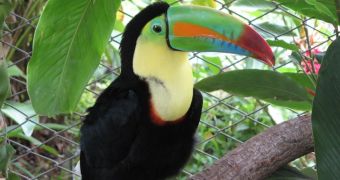Environmental scientists say that deforestation in the Brazilian rainforest has caused several large, fruit-eating bird species to either go extinct or experience a decline in their population.
Local palm trees count on these birds to have their seeds dispersed.
Since big birds are no longer a common sight in these forests, trees were forced to adapt, meaning that they started producing smaller seeds that can be eaten by other bird species and thus spread across the land.
The only problem is that, unlike the slightly bigger seeds these trees used to produce, the smaller ones are more vulnerable to the environmental conditions they are exposed to, Mongabay explains.
In other words: they have high chances of being destroyed before they get to germinate.
“Habitat loss and species extinction is causing drastic changes in the composition and structure of ecosystems, because critical ecological interactions are being lost.”
“This involves the loss of key ecosystem functions that can determine evolutionary changes much faster than we anticipated,” researcher Mauro Galetti explains.
A detailed account of this investigation into how deforestation affects natural ecosystems in the Brazilian rainforest is made available to the public in the journal Science.

 14 DAY TRIAL //
14 DAY TRIAL //